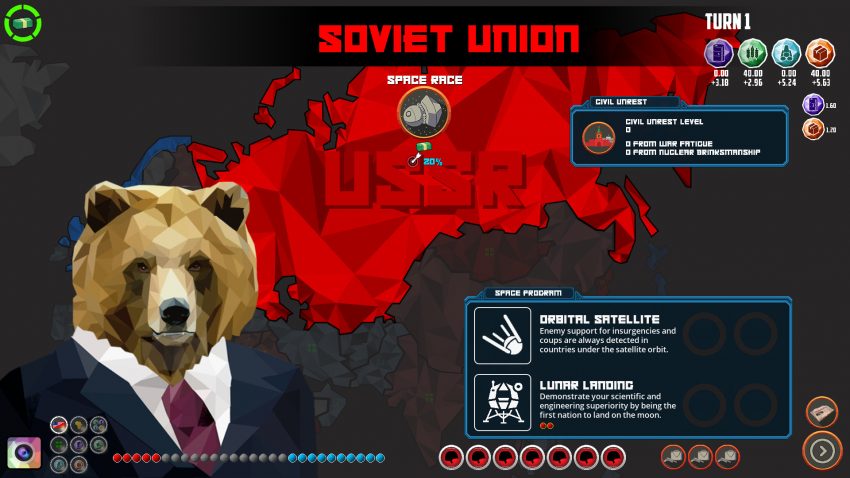A Basic Guide to playing and succeeding at Precipice.
Suggestions for Trade, Investments, Stability, Spies / Counter Spy Ops, Escalation Management.
Guide to Precipice : (A Candle in the Darkness.)
Point System
A Man’s gotta Know His “Basic Limitations”
2. First Turn
3. Trade (a tale of Quid pro Quo)
4. Space Race (To the moon Alice)
5. Stabilize your Allies (There, there little buddy)
6 Destabilize your Enemy’s Allies (Hey, Psst, You Wanna see somethin? Come over here.)
7. Invasion for fun and Profit (Sucker!)
8. Counter Spies
9. Escalation (Game Over Man, Game Over!)
10. Salutations
1. A Man’s Gotta Know His “Basic Limitations”
a) Points are set by:
i) Varying control of spheres of influence:
(1) Warsaw Pact, NATO, S. Asia, etc. (Supremacy grants more point than a majority))
ii) Solving a randomized world crisis (Famine in Africa, etc) (1-2 points).
iii) First to the moon (2 points).
b) You can wait out your opponent on the timer, or gain enough point to have supremacy.
c) You have a limited amount of money / effort available each turn; and some actions cost resource as well.
d) You can only increase the stability of allied nations. Sometimes you will spend money on diplomacy with a neutral nation you want to convert to an ally. (For trade, goals, or regional bloc power ratios).
2. First Turn (Ok, Let’s Get Started).
3. Trade (A Tale of Quid pro Quo)
a) The longer you trade, the more a nation likes you and may earn their loyalty, and this can improve how willing they are to listen to your diplomacy.
i) Trade with friends to reinforce loyalty (darker colors)
ii) Trade with neutrals to persuade to your side (white to light color)
iii) Trade with slight / lukewarm enemies, to persuade to neutrality (light opponent to white)
b) Only some nations have trade values. (Thus you may wish to ignore problems in none trade nations, to focus on nations with value).
c) Dark colored (highly loyal) nations do not trade with their primary opponent.
4. (Space Race (To the Moon Alice)
a) Satellites help uncover enemy subterfuge, and lower cost of counter spy actions
b) First to the moon gains 2 points toward domination
5. Stabilize your Allies (There, there little buddy)
a) Use troops in friendly nations you consider at risk of invasion by your opponent.
a) Sabotage, insurrection, invasion: while destabilizing, may be also detected, and if so challenged.
b) Low level destabilization may also be detected by the nation acted on, and drive them further into the opponents influence.
c) Spies can provide / increase the likelihood of success for destabilization
7. Invasion for fun and Profit (Sucker!)
Rarely conduct Invasions….
1. This depletes your manpower to protect those regions vital to you
2. But It can be conducted for a turn, to destabilize a vital enemy nation.
3. Just stand down immediately, if caught, you may have hurt them anyway.
(But you might have lost some Allies and even suffered stability loss yourself!).
HOWEVER….
4. You do NOT always have to challenge your opponents invasions. (Do the initial UN challenge and drop it.)
5. But, now you can support the counter invasion (if it did not have an overwhelming victory at the start).
6. Every turn you do this cost you both money/effort and resources, but it also destabilizes your opponent (the war monger!)
8) Counter Spies (costs money / effort):
ii) Spend money infiltrating the opponents spy network, to see what region they are deployed
iii) Observe where destabilization occurs against your allies, giving you good clues as to where to conduct counter spy ops.
iv) Watch the announcements / history for opponent spy deployment; if you have failed a couple attempts and the opponent has not removed their spy, keep trying all of the nations identified by your infiltration, until you get success.
v) Selecting the correct nation the opponent spy is in, is a 100% elimination of the enemy spy.
9) Escalation (Game Over Man, Game Over!)
b) When you escalate or back down you lose support of different allies; but you lose more when you back down. (pushing the player to continue to escalate further.)
c) But this happens to you opponent as well.
d) There are times to back down, and times to escalate.
e) Watch to see “who” is upset with you, sometimes it is worth it, the “fade” a strong ally into being lukewarm; or a lukewarm ally to neutral (if you back down in order to do the same to (hopefully)more important allies of your opponent.
f) If you escalate to the brink, sometimes the choice for a nuclear exchange is yours / sometimes it is your opponent’s. If there is war, both side lose.
g) If you play a human opponent, and they sense you are going to outscore them, they may be more willing to push escalations, as they have already ‘lost” the game.
h) You may elect to NOT respond to provocations, or provide opportunities to have challenged. (if you are confident you will out score them.)
10. Salutations
10) Remember it is a beer and pretzels game (and personally, I like the irony in the animal national avatars). Good luck and have fun.
11) “Cladem ad Democratica Factio” Long live the Republic.
